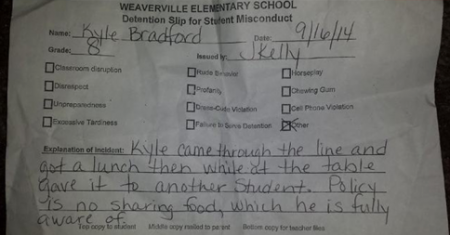The following debate originally took place on my Facebook wall, upon my post, “Public School Lesson #666: Students Will Not Engage in Acts of Charity With Their Food“…
Rayn: Public School Lesson #666:
Students Will Not Engage in Acts of Charity With Their Food, Nor Will They Share Food With Each Other While On School Grounds
Jessi C.: That is ridiculously outrageous…the boy was trying to be good and caring for another…what a world we live in…punished for being a good person…smh
Marilyn W.: SMH!
Stacie T.: I agree with that rule. My son had a milk allergy and reading ingredients showed me that there is milk and milk product in a lot of things you wouldn’t expect. He could end up eating something need not supposed to have. I also wouldn’t want my kids eating from someone else because I don’t know who they are. I’ve never been in their kitchen. I don’t know if they are clean. I know someone who hid her kid’s medication in his applesauce. She did it in the morning before school, but what if someone sent their kid to school with it like that and my kid ate it? If a kid isn’t getting a decent lunch from home, it should be the school’s responsibility to make sure the kid is fed.
Patricia G.: The reason is food allergies. The kid could have died.
Rayn: I don’t agree with this rule because it indiscriminately punishes peaceful and dangerous activity, alike, as though both were equal. That only confuses the issue of food allergies, and trivializes the dangers of such, in the process. Plus, since the school mentions hygiene as another factor, the same effect applies there, as well. And, with only about 7.7% of school-aged children having food allergies (equaling an average of roughly two students per classroom), it would be MUCH MORE reasonable to make sure that the FEW children within the stated risk group are actually being protected through policy, instead of of going about harassing, punishing and violating the rights of the almost 93% of the student body left unaffected. The only lesson here seems to be that “zero tolerance is best,” though it is precisely this sort of thinking that has been systematically turning public schools into veritable prisons, for decades!
In State schools across the country, including parts of New York, New Jersey, Maryland and North Carolina, children can’t even enjoy a consensual hug or hold hands without punishment… all in the name of “safety”!
Healthy social activity between students is slowly being condemned at school, while children are being taught to treat their peers with undue suspicion, to bow to accusatory rules from coercive authorities, to mindlessly comply with arbitrarily orders from “superiors,” and to accept pre-crime as legitimate. Yet, interesting enough, “socializing” is one of the MAIN reasons that parents even subject their children to the torturous, humiliating, nightmarish hazing ritual known as “public school,” instead of teaching them at home.
And, I’m sure this fact will mean very little to the authoritarians out there, but neither of the two children involved actually HAS allergies to speak of! And, this both illustrates the accuracy of the above-quoted stats, and renders most excuses for this policy absolutely moot!
“And, not one child was saved that day!” 😉
Meanwhile, astute readers will note that BOTH BOYS had gotten their food from the school cafeteria menu, which offered them each the same exact options, as allergy-free students. The boy who shared his lunch implied that the second boy was given a low-quality item from the menu (cheaper), and that “he couldn’t get normal lunch” (i.e. the burrito), leaving him dissatisfied with his meal. There’s more to this part of the story, I’m sure, but it seems to have been tidied up a bit… possibly in the interest of protecting the other student involved, or to protect the reputation of the school.
Stacie T.: You can’t, however, expect the children to remember who has allergies and who doesn’t. They will not know. There is no way to protect the children with allergies unless these policies are universal. There are certain school menu items that my son was not allowed to have and the school staff had to make sure that he was not served those items at breakfast time. I sent him with lunch from home. I agree with you on the hugging policy. That’s a crock, but certain rules are necessary.
Rayn: I’m not so sure about that, as I still remember my classmate, Courtney Gray, from second grade elementary school, when I was eight years old, who the teacher directed the whole class not to give any snacks to, because she was severely diabetic, and on a special diet. It was a learning experience for us all, not an excuse to arbitrarily harass and punish innocuous behavior in the name of “safety.” And, I obviously didn’t forget it… Also, she never even once had a shared-food induced medical emergency in the entire three years she attended school (though, the medicine necessary to treat such an event was in the nurse’s office, just in case, of course).
Let’s just keep in mind that we’re talking about an average of two food-allergic students per class. That isn’t difficult to remember. And, at thirteen years old, which is the age of these boys, I’d say that the children with food allergies, themselves, should have already been tasked with remembering what foods to avoid eating. And, those with common allergies should have also already long-been taught not to accept any food from their classmates, unless they can directly verify all the ingredients as benign (i.e. a packaged food product with list of ingredients).
Stacie T.: When we were kids there were a lot less kids diagnosed with food allergy. There was less testing done. Now it’s part of regular blood work. That’s how I found out. My kids have had classrooms with more than two children with various allergies. Allergies are part of medical record and that is protected under hippa law, so the school warning the children not to share with a specific student because of allergies, diabetes, celiac or any other health issue is actually against the law.
Stacie T.: Hipaa*
Jessi C.: The picture of the notice says this was 8th grade, I’m sure every student in 8th grade and middle school knows what food allergy they have. My kids are in 5th and 7th and their friends with food allergies know exactly what they can and cannot have. My kids do share their snacks especially when another kid doesn’t have one. My daughter has a friend who usually doesn’t have a snack so she always takes 2 to school. But she can tell you who has food allergies in her class because the students as well as the teachers know.
Jessi C.: I just don’t understand why he is being punished for trying to be a good person!!! I guess it’s a crime to be a decent person that is what this is teaching him!!
Stacie T.: It also says that it is an elementary school. If the school goes from pk-grade 8, you run into a problem where you have half the kids able to know better and half the kids who are not, so you would have to say only the upper grades are able to share. If you leave too many clauses in a rule, you are leaving too much room for interpretation. That allows for selective punishments. The rule needs to be universal. This one in particular has a purpose. We should definitely be fighting the useless rules like the “no hugging” policies that Rayn was talking about, but this one is important. With school staff shortages and classrooms packed with 30 or more students per class, there needs to be a system in place that the staff can manage to keep all the kids safe.
Rayn: It’s only a hipaa violation for a teacher to disclose medical information about a child without parental consent. So, tell me… what sort of parent(s) would be more worried about a hipaa violation than protecting their food-allergic child from KNOWN danger by giving the teacher consent to instruct the class on how to keep him safe in his earlier years of school, in the case where doing so would be significantly helpful (i.e. a deadly allergy to a very common food)? It wouldn’t happen to be the same sort of parent willing to violate the rights of up to 93% of their child’s classmates in order to engage in pure denial about the special treatment their child requires to maintain health and safety at school, now would it?
Yes, food allergies are becoming more common, but, as it stands, the rate of those children afflicted is STILL CURRENTLY only approximately 7.8% of the student body (about two children per classroom, as I already noted, previously). And, the amount of that group with deadly food allergies is even smaller:
Food Allergy Facts and Stats:
http://www.foodallergy.org/facts-and-stats
But, speaking of “the law” regarding dangerous food allergies…
While the USDA states, “the school food service may make food substitutions, at their discretion, for individual children who do not have a disability, but who are medically certified as having a special medical or dietary need,” it also states, “impairments that may not have previously been considered to be disabilities because of the ameliorative effects of mitigating measures might now meet the Section 504 and ADA definition of DISABILITY. For example, a student who has an allergy and requires allergy shots to manage that condition would be covered under Section 504 and Title II if, without the shots, the allergy would substantially limit a major life activity” (emphasis mine).
Meanwhile, while the US Department of Education states that “when in the licensed physician’s assessment, food allergies may result in severe, life-threatening (anaphylactic) reactions, the child’s condition would meet the definition of ‘disability’.”
With this in mind, Section 12101 of the Americans with Disabilities Act establishes “overprotective rules and policies” as forms of discrimination against the disabled:
“(5) individuals with disabilities continually encounter various forms of discrimination, including … OVERPROTECTIVE RULES AND POLICIES…”
Besides this, “the Individuals with Disabilities Education Act (IDEA) (formerly called P.L. 94-142 or the Education for all Handicapped Children Act of 1975) requires public schools to make available to all eligible children with disabilities a free appropriate public education IN THE LEAST RESTRICTIVE ENVIRONMENT APPROPRIATE TO THE INDIVIDUAL NEEDS” (emphasis mine).
Basically, the food-allergic children MOST in need of protection under the law, are instead being VICTIMIZED by highly restrictive and overprotective rules, simply in the school’s interest of maintaining the collectivist goal of uniformity, and forced “equality” over equal opportunity. The school is literally REFUSING to admit the COLD, HARD TRUTH that DISABLED CHILDREN on their campus require LEGALLY-PROTECTED “SPECIAL TREATMENT.” Administrators are completely trivializing the issue of dangerous food allergies in their severe overreaction to the medical facts at hand. And, incidentally, in their self-insulated bubble of denial about the realities of severe food allergies, they are ill-preparing both food allergy-afflicted students and those without, alike, for dealing with them!
In actuality, medical professionals recommended a specialized “504 Plan” for each child with severe allergies. This consists of an “Individual Healthcare Plan (IHP)” and a “Food Allergy & Anaphylaxis Emergency Care Plan.” When it comes to dangerous disabilities like food allergies, IT IS NOT THE APPROPRIATE TIME to teach children individuality-stripping lessons about the “importance” of “universal rules,” nor is it the time to present children with disingenuous theatrics to falsely indicate that “everyone is exactly the same.” It’s not honest. It’s not helpful. And, it’s not necessary!
The road to Hell is paved with “good intentions”… So, what’s next? Will the school burn through its budget providing epi-pens to all students in the interest of”fairness”? LOL! Oh? That wouldn’t be a “common sense” approach when addressing the numbers involved? Well, how is it any less ridiculous than restricting all food sharing among students because a small minority have severe allergies? OH, THE IRONY! Is this sort of doublethink not an implicit admission that mindlessly tyrannical “universal rules” are limited ONLY by MONETARY CONCERNS, but not HUMAN RIGHTS?!!!
Rayn: “Of all tyrannies, a tyranny sincerely exercised for the good of its victims may be the most oppressive. It would be better to live under robber barons than under omnipotent moral busybodies. The robber baron’s cruelty may sometimes sleep, his cupidity may at some point be satiated; but those who torment us for our own good will torment us without end for they do so with the approval of their own conscience” — C.S. Lewis
(All original portions of this work, by Rayn Kleipe, are licensed under a Creative Commons Attribution-NonCommercial-ShareAlike 4.0 International License, while all redistributed links, images, sounds, videos, and writings are protected under 17 U.S.C. § 107: Fair Use, or under Public Domain)











